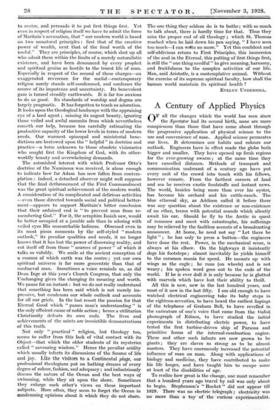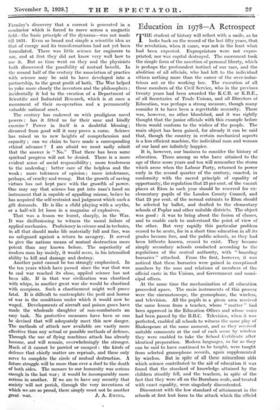A Century of Applied Physics O F all the chan g es which
the world has seen since the Spectator had its second birth, none are more conspicuous than those that have come about through the progressive application of physical science to the use and convenience of man. Applied science permeates our lives. It determines our habits and colours our outlook. Engineers have in effect made the globe both bigger and smaller. They have opened up fresh regions for the ever-growing swarm ; at the same time they have cancelled distance. Methods of transport and communication undreamt of a century ago have put every unit of the crowd into touch with his fellows, however remote. From the farthest corners of land and sea he receives exotic foodstuffs and instant news. The world, besides being more than ever his oyster, has become his orchard and his cattle-ranch. The blue ethereal sky, as Addison called it before there was any question about the existence or non-existence of an ether, teems with potential sounds which silently await his ear. Should he fly to the Arctic in quest of romance and meet with catastrophe, his sufferings may be relieved by the faultless accents of a broadcasting announcer. At home, he need not say " Let there be light " ; he has only to press a button—the engineers have done the rest. Power, in the mechanical sense, is always at his elbow. On the highways it insistently dogs his footsteps ; almost inevitably he yields himself to the common mania for speed. He mounts up with wings as the eagle ; he runs (on wheels) and is not weary ; his spoken word goes out to the ends of the world. If he is ever dull it is only because he is glutted with marvels which have lost their ability to thrill. All this is new, new in the last hundred years, and most of it new in the last fifty. I am old enough to have watched electrical engineering take its baby steps in the eighteen-seventies, to have heard the earliest lispings of the telephone of Graham Bell, to have revelled in the caricature of one's voice that came from the tinfoil phonograph of Edison, to have studied the initial experiments in distributing electric power, to have tested the first turbine-driven ship of Parsons and primitive forms of the internal-combustion engine. These and other such infants are now grown to be giants ; they are slaves so strong as to be almost masters. They have enormously increased the potential influence of man on man. Along with applications of biology and medicine, they have contributed to make his life longer, and have taught him to escape some at least of the disabilities of age. To realize how great is the change, one must remember that a hundred years ago travel by rail was only about to begin. Stephenson's " Rocket " did not appear till 1829. There was no electric telegraph ; electricity was no more than a toy of the curious experimentalist. Faraday's discovery that a current is generated in a conductor which is forced to move across a magnetic field—the basic principle of the dynamo—was not made till 1831. Even so broad and simple a scientific idea as that of energy and its transformations had not yet been formulated. There was little science for engineers to use, and at first they did not know very well how to use it. But as time went on they and the physicists both discovered the possibility of mutual benefit. In the second half of the century the association of practice with science may be said to have developed into a partnership, to the great profit of both. The War helped to yoke more closely the inventors and the philosophers ; incidentally it led to the creation of a Department of Scientific and Industrial Research, which is at once a monument of their co-operation and a permanently valuable national asset.
The century has endowed us with prodigious novel powers : has it fitted us for their, sane and kindly exercise ? Power in itself is a doubtful blessing ; divorced from good will it may prove a curse. Science has raised us to new heights of comprehension and capacity ; can we claim to have made a corresponding ethical advance ? I am afraid we must sadly admit that the answer is " No." That there has been some spiritual progress will not be denied. There is a more evident sense of social responsibility ; more tenderness to the underdog ; better care of the helpless and the weak ; more tolerance of opinion ; more intolerance, perhaps, of cruelty and wrong. But the growth of saving virtues has not kept pace with the growfth of power. One may say that science has put into man's hand an instrument that is capable of appalling misuse, before he has acquired the self-restraint and judgment which such a gift demands. He is like a child playing with a scythe, or a half-wit let loose in a magazine of explosives.
That was a lesson we learnt, sharply, in the War. It was disillusioning to witness the moral failure of applied mechanics. Proficiency in science and in technics, in all that should make life materially full and fine, was no safeguard against a return to savagery. It served to give the nations means of mutual destruction more potent than any known before. The superiority of modern man lay mainly, it would seem, in his intensified ability to kill and damage and destroy. Another point cannot be too strongly emphasized. In the ten years which have passed since the war that was to end war reached its close, applied science has not been idle. If in that war civilization was chastised with whips, in another great war she would be chastised with scorpions. Such a chastisement might well prove fatal. It is difficult to contemplate the peril and horror of war in the conditions under which it would now be waged. Developments of aircraft and poison gases have made the wholesale slaughter of non-combatants an easy task. No protective measures have been or can be devised that will adequately meet this new danger. The methods of attack now available are vastly more effective than any actual or possible methods of defence. Through the use of flying machines attack has already become, and will remain, overwhelmingly the stronger. Much of it cannot be parried or escaped : the kinds of defence that chiefly matter are reprisals, and these only serve to complete the circle of mutual destruction. A future struggle will be more than ever a duel to the death of both sides. The menace to our humanity was serious enough in the last war ; it would be incomparably more serious in another. If we are to have any security that society 'will not perish, through the very inventions of which we are so proud, there simply must not be another



















































































































 Previous page
Previous page